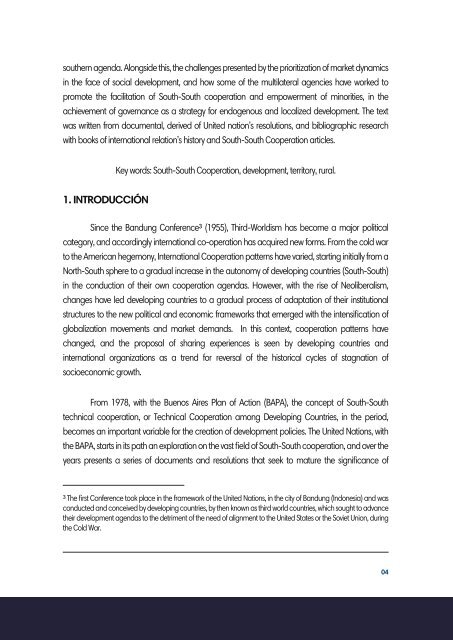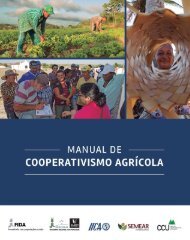The Evolution of South-South Cooperation
Since the Bandung Conference in 1955, the countries of the South have organized themselves in a structured way to achieve better levels of development. This article aims to present the evolution and recent trends of South-South Cooperation, showing how the historical dynamics have led the United Nations and its agencies to adopt a territorial approach, with a strong appeal to mobilize local actors. Allied to this, the increase of the independence of the actors that, with autonomy, manage to dialogue and conduct initiatives of cooperation outside the formal sphere of the central government. This article also aims to present rural development, agriculture and food security as essential factors for the development that since 1978, with BAPA (Buenos Aires Plan of Action), is one of the main thematic lines presented when it comes to the development of the southern agenda. Alongside this, the challenges presented by the prioritization of market dynamics in the face of social development, and how some of the multilateral agencies have worked to promote the facilitation of South-South cooperation and empowerment of minorities, in the achievement of governance as a strategy for endogenous and localized development
Since the Bandung Conference in 1955, the countries of the South have organized themselves in a structured way to achieve better levels of development. This article aims to present the evolution and recent trends of South-South Cooperation, showing how the historical dynamics have led the United Nations and its agencies to adopt a territorial approach, with a strong appeal to mobilize local actors.
Allied to this, the increase of the independence of the actors that, with autonomy, manage to dialogue and conduct initiatives of cooperation outside the formal sphere of the central government. This article also aims to present rural development, agriculture and food security as essential factors for the development that since 1978, with BAPA (Buenos Aires Plan of Action), is one of the main thematic lines presented when it comes to the development of the southern agenda. Alongside this, the challenges presented by the prioritization of market dynamics in the face of social development, and how some of the multilateral agencies have worked to promote the facilitation of South-South cooperation and empowerment of minorities, in the achievement of governance as a strategy for endogenous and localized development
You also want an ePaper? Increase the reach of your titles
YUMPU automatically turns print PDFs into web optimized ePapers that Google loves.
southern agenda. Alongside this, the challenges presented by the prioritization <strong>of</strong> market dynamics<br />
in the face <strong>of</strong> social development, and how some <strong>of</strong> the multilateral agencies have worked to<br />
promote the facilitation <strong>of</strong> <strong>South</strong>-<strong>South</strong> cooperation and empowerment <strong>of</strong> minorities, in the<br />
achievement <strong>of</strong> governance as a strategy for endogenous and localized development. <strong>The</strong> text<br />
was written from documental, derived <strong>of</strong> United nation’s resolutions, and bibliographic research<br />
with books <strong>of</strong> international relation’s history and <strong>South</strong>-<strong>South</strong> <strong>Cooperation</strong> articles.<br />
Key words: <strong>South</strong>-<strong>South</strong> <strong>Cooperation</strong>, development, territory, rural.<br />
1. INTRODUCCIÓN<br />
Since the Bandung Conference3 (1955), Third-Worldism has become a major political<br />
category, and accordingly international co-operation has acquired new forms. From the cold war<br />
to the American hegemony, International <strong>Cooperation</strong> patterns have varied, starting initially from a<br />
North-<strong>South</strong> sphere to a gradual increase in the autonomy <strong>of</strong> developing countries (<strong>South</strong>-<strong>South</strong>)<br />
in the conduction <strong>of</strong> their own cooperation agendas. However, with the rise <strong>of</strong> Neoliberalism,<br />
changes have led developing countries to a gradual process <strong>of</strong> adaptation <strong>of</strong> their institutional<br />
structures to the new political and economic frameworks that emerged with the intensification <strong>of</strong><br />
globalization movements and market demands. In this context, cooperation patterns have<br />
changed, and the proposal <strong>of</strong> sharing experiences is seen by developing countries and<br />
international organizations as a trend for reversal <strong>of</strong> the historical cycles <strong>of</strong> stagnation <strong>of</strong><br />
socioeconomic growth.<br />
From 1978, with the Buenos Aires Plan <strong>of</strong> Action (BAPA), the concept <strong>of</strong> <strong>South</strong>-<strong>South</strong><br />
technical cooperation, or Technical <strong>Cooperation</strong> among Developing Countries, in the period,<br />
becomes an important variable for the creation <strong>of</strong> development policies. <strong>The</strong> United Nations, with<br />
the BAPA, starts in its path an exploration on the vast field <strong>of</strong> <strong>South</strong>-<strong>South</strong> cooperation, and over the<br />
years presents a series <strong>of</strong> documents and resolutions that seek to mature the significance <strong>of</strong><br />
3 <strong>The</strong> first Conference took place in the framework <strong>of</strong> the United Nations, in the city <strong>of</strong> Bandung (Indonesia) and was<br />
conducted and conceived by developing countries, by then known as third world countries, which sought to advance<br />
their development agendas to the detriment <strong>of</strong> the need <strong>of</strong> alignment to the United States or the Soviet Union, during<br />
the Cold War.<br />
04




